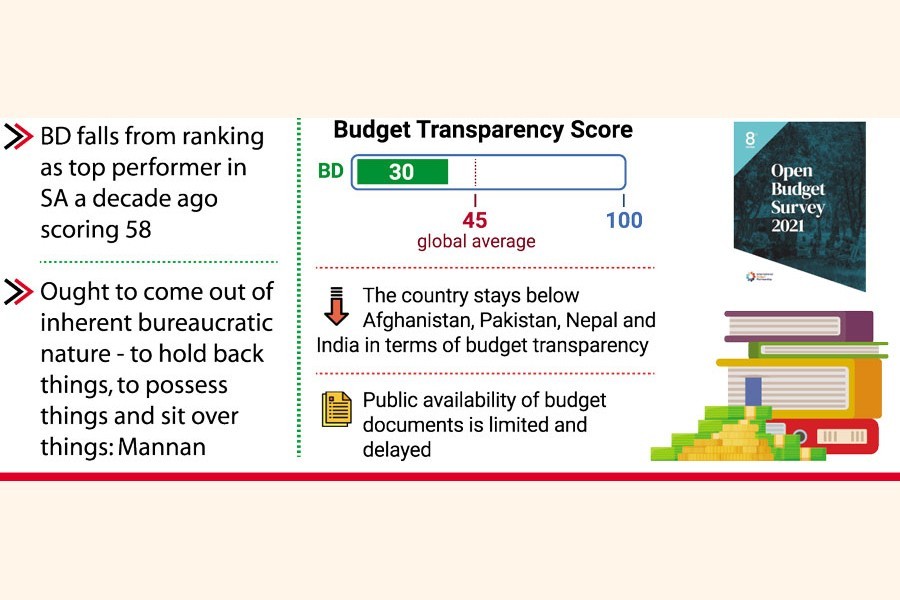Transparency in Bangladesh's budget-making process continues to deteriorate, slipping to the lowest stand in the subcontinent as per a latest revelation on global rankings.
In the 8th edition of Open Budget Survey (OBS), 2021, sponsored by the Washington-based International Budget Partnership (IBP), Bangladesh scored only 30 out of 100, far below the global average of 45.
With the latest score, the country is now placed in the 95th position among 120 countries, although Bangladesh was the top performer in South Asia a decade ago with the score of 58.
In the previous edition in 2019, Bangladesh's position was 79th among 117 countries, according to the survey report unveiled Monday at a function attended by the planning minister as chief guest.
The OBS markings were prepared on the basis of countries' budget transparency, public participation, and budget-oversight situation. In these three areas, Bangladesh's scores were 30, 13 and 39 respectively.
Economists made their critical observations on the survey findings rolled out at the webinar jointly hosted by International Budget Partnership and RAPID (Research and Policy Integration for Development) .
RAPID Chairman Dr MA Razzaque moderated the virtual discussion titled 'Open Budget Survey 2021: Findings and Reflections'.
Planning Minister MA Mannan, speaking as the chief guest, didn't disagree with the speakers on the point of opacity in budget preparation to some extent.
As a keynote speaker, RAPID executive director Prof Mohammad Abu Eusuf said Bangladesh's transparency score has been on the decline over the period since 2012 when the score was 58. Thereafter, the standing went on a slope, declining to 56 in 2015 and further dropping to 41 in 2017 and 36 in 2019.
He said Bangladesh's performance dropped mainly due to delay in publication and non-publication of budget-related documents.
"Finance ministry in many cases publishes the documents and fiscal reports making several months' delay," Mr Eusuf, a professor of Dhaka University, told the meet.
"Even, mid-year review, year-end report and audit report were not published on time," he said.
He also mentioned that the government used to hold pre-budget discussions with various stakeholders in each fiscal but sans document or pre-budget statement through which the talks could be carried out with clarity.
"Many recommendations came up in such discussions but there is no follow-up system as to how many the government takes in the budgetary statement. So, there is room for improvement," he added.
Chairing the webinar, former Bangladesh Bank governor Dr Atiur Rahman highlighted the importance of bringing further transparency and accountability in the budget-making and- implementation stages.
"Why we're not being able to publish reports on time in accordance with the global best practice?. We can score better if we want. For that, we must have intention and stay focused on implementation," he observed.
He was also suggesting further engaging the parliamentary standing committees in the budget-formulation process.
Executive director of SANEM Dr Sayema Haque Bidisha said the ministry-wise and project-wise budgetary expenditures need to be evaluated qualitatively and the problems be identified if the allocation is not spent in accordance with the plan.
"Necessary steps are required to be taken accordingly before evaluating the progress in the following fiscal and a broad report regarding the assessment and repair moves should be published online," she suggests.
Deputy Secretary at the Ministry of Finance Mustafa Murshed had an explanation for the shortcomings mentioned. He said they need to check and crosscheck the data to ensure accuracy of the information and it takes some time.
"But we keep working so that we can publish budget-related reports on time," he adds.
General Secretary of the Economic Reporters' Forum (ERF) SM Rashidul Islam said the number of consultation meetings with the stakeholders keeps declining over the years. But it needs to be intensified to know desires of the various groups about the budget.
On the other hand, the budgetary matters are not discussed in the parliament even in the budgetary session, he added.
Planning Minister Mr MA Mannan also feels that budget needs to be more open and participatory so that people of all walks can know in detail about the income and expenditure.
"We need to leave our traditional reserved attitude. We need to be more open-open in a sense which is freely accessed," he told the meet.
He points out that the government publishes budgetary document like allocation at the time when the finance minister starts the proceedings at the parliament and shares with the ministries.
"But that is not enough as the ministries do not share the document with their divisions and grassroots- level offices or officers. As a result, services are not delivered properly," he said in a candid admission of the deficiencies.
"So, we need to come out of the inherent bureaucratic nature - to hold back things, to possess things and sit over things. We have to apply various instruments to this effect," he added.


